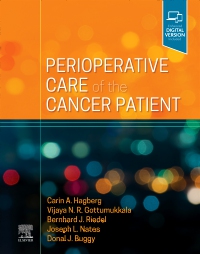
Perioperative Care of the Cancer Patient, 1st Edition
Hardcover

Now $214.82
-
-
Covers current clinical practice and perioperative care guidelines during the entire cancer journey for both adult and pediatric patients.
-
Includes a diverse array of topics on cancer care, such as cancer epidemiology, cancer biology, ethics in cancer care delivery, value proposition in cancer care, opportunities and challenges with research programs in perioperative cancer care, application of big data and computational sciences in cancer medicine and care delivery, and the MD Anderson Cancer Center Moon Shots Program®.
-
Discusses newer cancer therapies and their perioperative implications, functional assessment and prehabilitation, enhanced recovery programs in cancer care, challenges with novel cancer therapies in the care of the critically ill cancer patient, chronic and interventional pain management in patients with cancer, and more.
-
An educational resource and clinical reference for surgeons, anesthesia practitioners, hospitalists, internists, pain physicians, intensivists, basic science researchers, and all clinicians involved in the acute care of surgical patients with cancer.
-
Enhanced eBook version included with purchase. Your enhanced eBook allows you to access all of the text, figures, and references from the book on a variety of devices.
-
-
Section 1: Basic Principles (Epidemiology;Cancer Biology; Overview of Cancer Therapies)
1 Cancer Epidemiology, Prevention, and Survivorship
2 Global Cancer Surgery—The Lancet Commission
3 Cancer Biology and Implications for the Perioperative Period
4 Traditional Cancer Therapies and Perioperative Implications
5 Newer Cancer Therapies and Perioperative Implications
6 Cancer and Heart Disease
7 Personalized Cancer Care
Section 2: Inflammatory-Immune Responses, Perioperative Period, and Cancer Outcomes
8 Anemia, Thrombosis, Transfusion Therapy, and Cancer Outcomes
9 Improving Cancer Survival Through Perioperative Attenuation of Adrenergic- Inflammatory Signaling
10 Local Anesthetics and Cancer
11 Volatile and Intravenous Anesthetics and Cancer
12 Opioids and Cancer
13 Can Regional Anesthesia and Analgesia Influence the Risk of Cancer Recurrence?
Section 3: Perioperative/Periprocedural Care in the Cancer Patient
14 Preoperative Evaluation and Medical Optimization of the Cancer Patient
15 Functional Assessment and Prehabilitation
16 Redesign of Perioperative Care Pathways
17 Airway Management in Special Situations
18 Procedural Care of the Adult Cancer Patient Outside of the Operating Room
19 Perioperative Care of the Surgical Patient: Brain
20 Anesthesia for Spine Cancer Surgery
21 Anesthesia for Head and Neck Cancer Surgeries
22 Perioperative Care of the Surgical Patient: Heart, Lung, and Mediastinum Procedures
23 Perioperative Care of the Cancer Patient: Breast Procedures
24 Intraoperative Care of the Surgical Patient: Upper Gastrointestinal Cancers
25 Perioperative Care of the Colorectal Cancer Patient
26 Perioperative Care of the Surgical Patient: Genitourinary Cancers
27 Perioperative Care of the Surgical Cancer Patient: Gynecologic Cancers
28 Anesthesiology and Perioperative Management of Patients Presenting for Surgical Excision of Endocrine Tumors
29 Anesthesia and Surgery for CytoreductiveSurgery With Hyperthermic Intraperitoneal Chemotherapy (HIPEC)
30 Perioperative Care: Sarcoma and Melanoma
31 Perioperative Care of the Surgical Patient: Bone and Soft Tissue Tumors
32 Perioperative Care of the Surgical Patient: Reconstructive Surgery
33 Perioperative Care of the Surgical Patient: Surgical Emergencies in Cancer
34 Palliative Surgery in Cancer Patients
35 Frailty in the Perioperative Setting for Cancer Patients
36 Delivering Perioperative Care for Older Patients Undergoing Cancer Surgery
Section 4: Acute Postoperative and Intensive Care of the Cancer Patient
37 Special Considerations in the Postoperative Care of the Cancer Patient
38 Early Warning and Rapid Response Systems
39 Intensive Care Considerations of the Cancer Patient
40 The Challenges of Novel Therapies in the Care of the Critically Ill Cancer Patient
Section 5: Pain and Palliative/Integrative Medicine
41 Acute Postsurgical Pain Management in Patients With Cancer
42 Chronic and Interventional Pain Management in Patients With Cancer
43 Rehabilitation, Palliative Care, and Integrative Medicine Interventions in Cancer
44 Integrating Rehabilitative and Palliative Care Principles Within Acute Care Practice
Section 6: Perioperative/Periprocedural Care of the Pediatric Patient With Cancer
45 Overview of Pediatric Cancers
46 Preoperative Assessment of the Pediatric Patient With Cancer
47 Intraoperative Management: Considerations for Specific Procedures in Children With Cancer
48 General Principles for Intensive Care Management of Pediatric Patients With Cancer
49 Anesthesia for Procedures Outside of the Operating Room
50 Do Not Resuscitate and the Terminally Ill Child
51 Chronic Pain and Palliative Care in the Pediatric Patient
52 Special Considerations for Intensive Care Management of Pediatric Patients With Cancer
Section 7: Value Proposition and Research in Perioperative Cancer Care
53 Value Proposition in Cancer Care: Quantifying Patient-Centered Value in a Comprehensive Cancer Care Center
54 Enhanced Surgical Recovery and Cancer
55 Symptom Assessment, Patient-Reported Outcomes, and Quality of Life Considerations in Perioperative Care for Patients With Cancer
56 Shared Decision-Making and Advance Care Planning in the Cancer Care Journey
57 Ethics in Cancer Care Delivery—Do Not Resuscitate
58 Economics of Cancer Care Delivery: Opportunities and Challenges
59 The Costs of Postoperative Complications After Major Abdominal Surgery: Opportunities and Challenges
60 Research in Perioperative Care of the Cancer Patient: Opportunities and Challenges
61 Big Data, Advances in Computational Sciences, and Oncology Care
62 The MD Anderson Cancer Center Moon Shots Program®: A Global Priority
Index

 as described in our
as described in our 